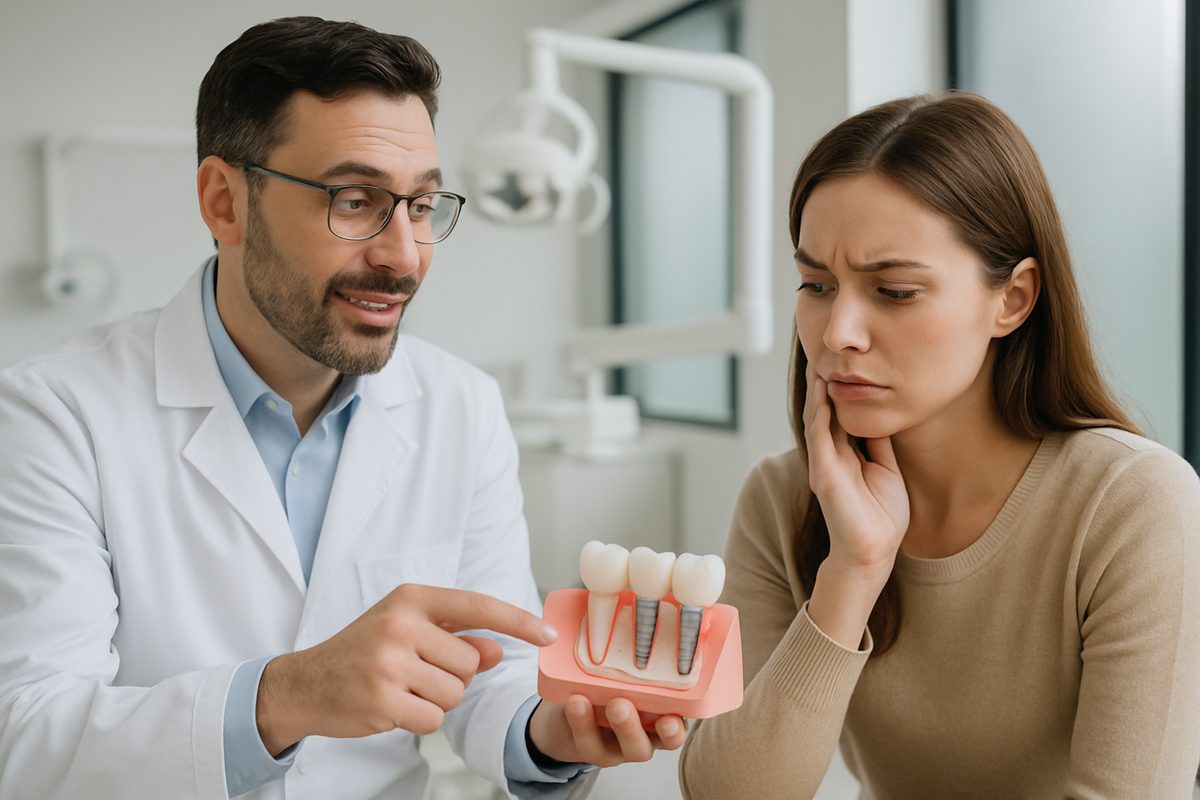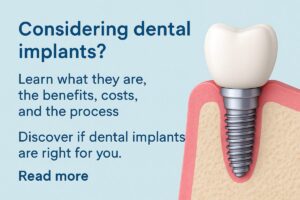How Safe Are Dental Implants? Berkeley, CA Periodontist Explains Dental implants are a common solution for missing teeth, but many patients ask, “how safe are implants in Berkeley, CA?” This post explains the main risks, success factors, and what to expect before, during, and after implant treatment. Read on to learn typical outcomes, how complications are prevented, and when to see a specialist.
How safe are implants? Quick overview and success rates
Implant safety is measured by success (healthy, functional implants) and survival (implants still in place). Most studies show 90–98% success over 5–10 years for healthy patients. Results vary by case, location in the mouth, and patient health. With proper planning and care, implants are a reliable long-term option.
Common risks and possible complications
Infection and peri-implantitis
Peri-implantitis is an infection and inflammation around the implant that can cause bone loss. Early signs include redness, swelling, bleeding, and bad taste. Prompt cleaning, improved oral hygiene, and professional care can often stop early disease. Left untreated, infection can lead to implant loss.
Nerve injury and altered sensation
Nerve injury is rare but can cause numbness, tingling, or burning in the lip, chin, or tongue. Report any lasting change in sensation right away. Careful imaging and planning reduce this risk, and most nerve irritations resolve over weeks to months.
Implant failure and mechanical issues
Failure can mean poor bone integration, loosened screws, or fractured components. Common causes include inadequate bone, excessive bite forces, or poor restoration fit. Regular checkups catch mechanical problems early and allow repairs before major damage.
Key factors that affect implant safety
Bone quality and quantity
Enough good bone is essential for stability. If bone is thin or missing, grafting or sinus lifts may be needed to create a secure foundation.
Overall health: smoking, diabetes, medications
Smoking, uncontrolled diabetes, and certain medications slow healing and raise complication risk. Discuss your health and medicines with your specialist before treatment.
Oral hygiene and periodontal history
A history of gum disease increases the chance of peri-implantitis. Strong home care and professional cleanings are crucial to protect implants long-term.
Modern techniques that lower risks
Digital imaging & 3D treatment planning
CBCT scans and 3D planning map nerves and bone, improving implant placement accuracy and safety.
Guided surgery, piezosurgery, and lasers
Guided surgery and piezosurgery reduce surgical trauma and protect soft tissues. Lasers can target diseased tissue with less bleeding and faster recovery.
Regenerative methods and diagnostics
Bone grafts, guided tissue regeneration, and oral DNA testing let clinicians rebuild anatomy and tailor treatment to each patient’s risk profile.
What to expect during surgery and recovery
Sedation options and comfort measures
Oral or IV sedation and local anesthesia keep patients comfortable. Pain is usually manageable with short-term medication.
Typical healing timeline and post-op care
Initial healing takes 1–2 weeks; bone integration can take 3–6 months. Follow-up visits, soft diet, and careful oral hygiene help recovery. Report swelling, severe pain, or numbness.
Long-term maintenance to keep implants safe
Daily brushing and flossing, professional cleanings, and periodic X-rays prevent peri-implant disease. Routine checks let your clinician catch problems early.
Why a board-certified periodontist matters for implant safety
A specialist brings advanced training in bone grafting, gum health, and managing complex cases. Dr. Keith Chertok, DDS is a board-certified periodontist in Berkeley, CA with expertise in implant care and technologies like LANAP®, piezosurgery, digital 3D planning, oral DNA testing, guided tissue regeneration, and sedation options. That training helps reduce risks and improve long-term outcomes.
When to talk to a specialist about implants
Seek a consultation if you have a history of gum disease, low bone, medical conditions like diabetes, or prior implant problems. To discuss how safe are implants in Berkeley, CA for your specific situation, schedule an evaluation to review your risks and get a personalized treatment plan.






